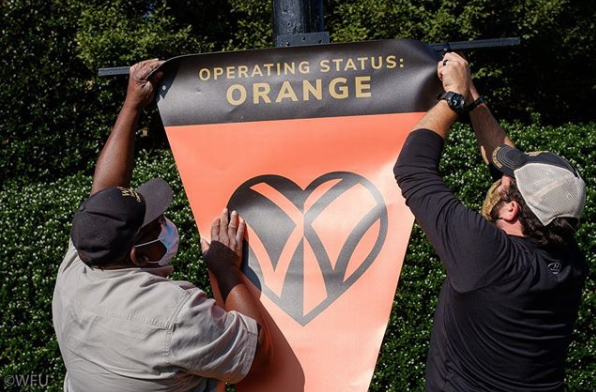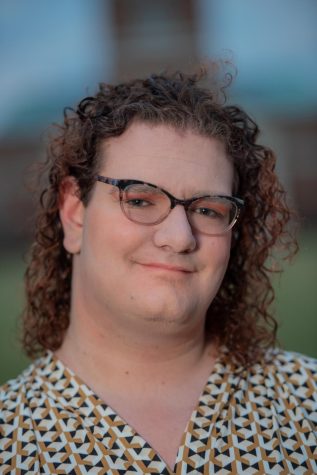University moves to modified Orange level restriction as cases mount
The university responded to the rising COVID-19 case counts with several new restrictions

February 6, 2021
As the number of campus COVID-19 cases reached 229 on Friday, several new restrictions were put in place to mitigate the spread of the virus.
These new constraints include closing large buildings like the Z. Smith Reynolds Library and Wellbeing Center, switching dining exclusively to grab-and-go, banning visitors in residence halls and dorm rooms and mandating that all student organizations meet virtually.
Restrictions on access to the library and Wellbeing Center are a result of anecdotal reports about maskless gatherings in unsupervised spaces throughout the two buildings, according to Provost Rogan Kersh.
“They’re enormous buildings, and we can’t possibly monitor what kind of unmasked activity, gathering, etc. could take place there,” Kersh said.
According to Kersh, the timing of the restrictions is both due to the large spike in cases over the past few days and the looming threat of “super spreader” Super Bowl parties this Sunday. The university was encouraged that the switch to Orange status from Yellow last October — which occurred the week before Halloween — seemed to have mitigated the threat posed by the normally celebratory holiday, per the provost.
“Halloween was a real scary spot,” Kersh said. “Many universities saw big spikes after Halloween; we did not. So our hope is that students will, with this pointed reminder, return to the very responsible and very responsive, public health guideline-upholding [behavior that occurred last semester].”
Tangentially, several Greek organizations are under investigation, including chapters of both Panhellenic and Interfraternity Council organizations. One sorority, Kappa Kappa Gamma, has been suspended because of COVID-19 violations. According to a report filed by the Winston-Salem Police Department, the sorority hosted a party at the Vintage Sofa Bar in downtown Winston-Salem.
Suspended chapters will not be permitted to hold chapter meetings, wear organizational letters or hold events. In addition, officials will track student IDs and license plates at the campus gates to prevent students from being shuttled to off-campus parties, according to information shared by multiple Panhellenic sororities. It has also been revealed that the university will pay special attention to vehicles arriving at the gates with more than one passenger inside, especially after the statewide curfew of 10 p.m.
Greek life organizations are not the only cause of the spike in cases, however, said Vice President for Campus Life Penny Rue.
“We have not seen much transmission in the fraternity strata, but we do monitor behavior off-campus,” Rue said. “We do have the Winston Salem [Police Department] who patrol that area and inform us if they see evidence of gatherings beyond the allowed limits.”
Rue clarified that the bulk of the transmission has occurred at bars and restaurants like Campus Gas, where multiple student gatherings have been reported. Some fraternities have been holding events at off-campus locations, such as the party mentioned above at the Vintage Sofa Bar.
An email sent on behalf of President Nathan Hatch, Kersh and Rue warned of a possible shift to Red status should case trends not improve. That would mean a 14-day campus-wide lockdown.
“Positive cases are coming primarily from social activity — small and large gatherings, on-and off-campus parties, and groups congregating at bars and restaurants,” the email stated. “In these cases, masks were not worn, gathering sizes were ignored and social distancing was not respected.”
As COVID-19 spreads from small and large group gatherings — both at off-campus restaurants and bars, such as Campus Gas and Earl’s, and social gatherings — the risk of community spread increases. As of Thursday, the Best Western and Hawthorne Inn were at 60% capacity.
“We certainly believe [those hotels] provide ample capacity, but right now [the capacity] is being stretched,” said Matt Clifford, Assistant Vice President of Campus Life and Dean of Residence Life and Housing. “The pace of cases certainly concerns [us].”
There are three contingency plans should the hotels continue to fill. The first of those, requiring off-campus students to quarantine in their residences, is already in effect. The second step, according to Clifford, would prioritize the hotel space for students who have tested positive. It could also mean that residents who have been asked to isolate due to possible exposures could be asked to isolate on campus. The third plan would expand the requirement of students to quarantine in place.
“We are slowly running out of the resource to house students in the hotels,” said Cecil Price, director of the Student Health Service. “Things are not working as well as we hoped with the return to campus.”
As the chance of going to Red operating status grows, university officials are urging students to stay home and avoid unsanctioned gatherings.
“[We must] recognize that the COVID virus is still deadly, still life-changing and still possible to spread between people in our community including faculty, staff and students with compromised immune systems,” Dean of Students Adam Goldstein said. “What we are experiencing now is a very scary surge.”
“The most important thing is mask compliance,” Rue said. “I know it’s not preferable … but that is a simple thing we can all do. The solutions are so simple, so I’m really counting on students to do their part to help us flatten the curve.”
























No Thanks • Feb 13, 2021 at 12:02 pm
I did not realize millions of N95 masks are available now from American manufacturers also. Some online sites (Amazon, FB, etc) do not list any of the 20+ American manufacturers products. (See article below). Sometimes the box says ships from the USA, which means acquired from China then shipped out of a U.S. warehouse. Some are made in America with imported materials, and some are made in America from American sourced materials. Here is the article which names some of the small US manufacturers that are losing with masks sitting in their warehouses.
“Can’t Find an N95 Mask? This Company Has 30 Million That It Can’t Sell.
Health workers are still being forced to ration protective masks, but small U.S. manufacturers can’t find buyers, and some are in a danger of going under.”
https://www.nytimes.com/2021/ 02/10/health/covid-masks- china-united-states.html
This is an illustration of what a real NIOSH approved N95 mask looks like with the embossing. if you’d like to view. Scroll to the bottom of this page.
https://www.cdc.gov/niosh/ npptl/topics/respirators/disp_ part/respsource1quest2.html